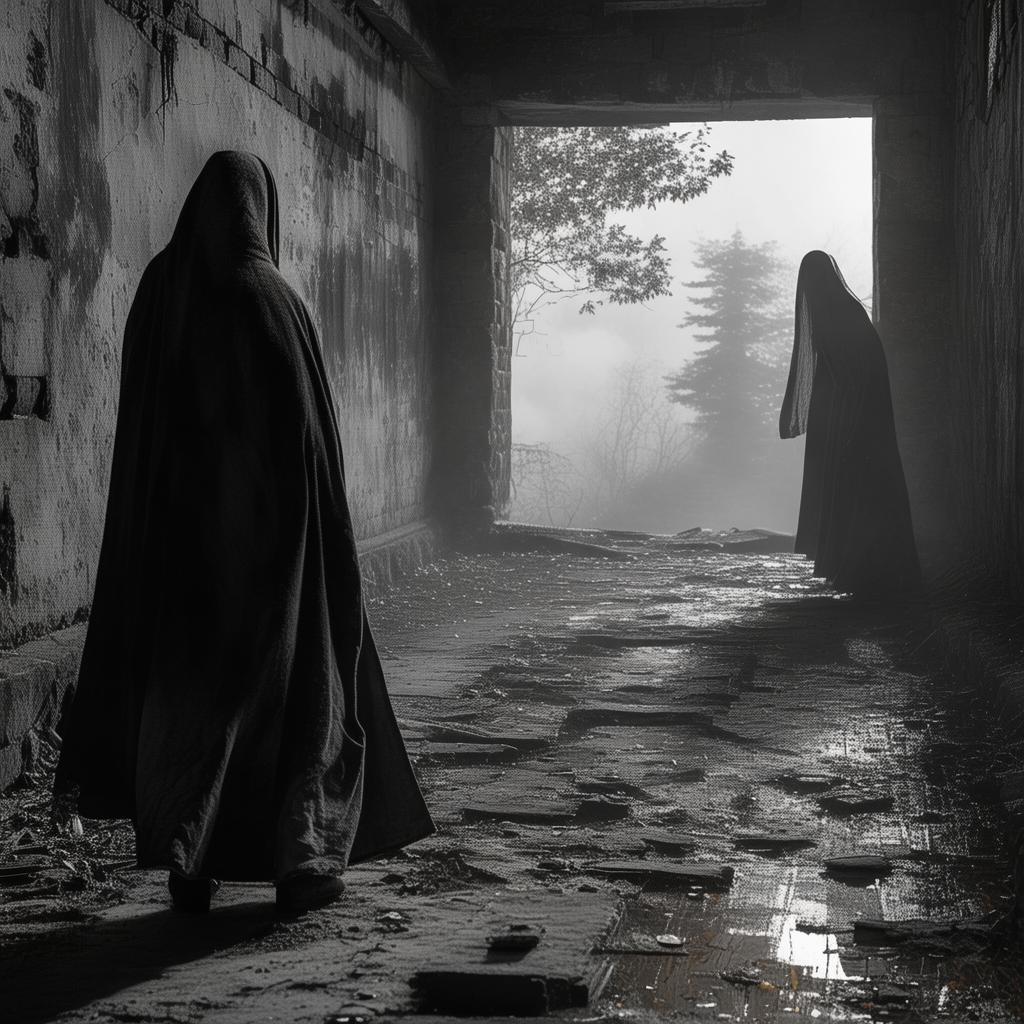The Echoes of the Abyss: A Tale of Unseen Vengeance
The rain began to fall as a ghostly mist seeped through the streets of Nanjing, a city forever scarred by its tragic past. In a dimly lit room, a young historian named Li Hua sat hunched over her desk, surrounded by stacks of old documents and photographs. Her latest project was a book about the 1937 Nanjing Massacre, an event she had always been fascinated by but now found to be more than just history.
The book, tentatively titled "The Nanjing Abyss: The Unseen Massacre's Requiem," had been her life for the past few years. She spent every evening researching, reading, and writing until the early hours of the morning. But as the days passed, she began to notice strange occurrences. Objects would move by themselves, and a faint, haunting melody would sometimes play on the radio, a tune that she couldn't quite place.
One night, Li Hua couldn't shake off the feeling that someone was watching her. She turned around, but the room was empty. The next morning, she found a torn piece of paper on her desk with an address scrawled in ink. The address was for the old Nanjing City God Temple, a place she had heard whispered about in the city's folklore but had never visited.
Curiosity piqued, Li Hua decided to visit the temple. The rain had stopped, and the sun began to rise, casting a pale glow over the ancient structure. As she stepped inside, she felt an overwhelming sense of dread. The temple was eerie, with its cobwebbed halls and stone statues of forgotten gods. She wandered deeper into the complex, her footsteps echoing in the silence.
Suddenly, a voice called out, "Li Hua, is that you?" Startled, she spun around, but no one was there. She realized the voice was not a sound but a feeling, a presence that seemed to reach out and touch her. The air around her seemed to shimmer, and she could almost see the ghosts of the fallen soldiers and civilians who had perished in the massacre.
Li Hua began to feel a strange connection to these spirits. She learned from them their stories, their sorrow, and their longing for justice. They spoke of a curse, a promise made by those who had survived, that they would not rest until their suffering was avenged.
The historian's life was changed forever. She felt a deep, almost overwhelming sense of responsibility. She knew that the spirits of the Nanjing Massacre were counting on her to bring their story to light. She dedicated herself to her research, writing with a newfound urgency.
As the book neared completion, Li Hua encountered more intense encounters with the spirits. She saw visions of soldiers and civilians, their eyes filled with terror and hope. The more she learned, the more she felt the weight of the past on her shoulders.

One night, as Li Hua was working late, the spirits appeared once again. This time, they were leading her to a secret location beneath the temple. She followed them down a narrow, damp passage, the air thick with the smell of damp earth and history.
At the end of the passage, they stopped before a large, sealed door. The spirits seemed to be urging Li Hua to break it open. With trembling hands, she pushed against the door, and it creaked open, revealing a chamber filled with the bones of the fallen. The sight was haunting, a reminder of the unimaginable horror that had taken place.
Li Hua knew that this was the climax of her journey. She needed to expose the truth, to ensure that the spirits of those who had perished in the massacre could finally rest in peace. She returned to her research, determined to uncover the remaining pieces of the puzzle.
As the book's publication date approached, Li Hua's life became a whirlwind of interviews, talks, and public appearances. She faced skepticism, but she also received support and admiration from those who understood the importance of her work.
On the day of the book's release, Li Hua stood in front of a crowd of journalists and historians. She spoke passionately about the massacre, her voice trembling with emotion. As she finished her speech, she felt a strange sensation, as if the spirits were with her, watching over her words.
In the months that followed, Li Hua's book became a bestseller. People from around the world read about the horrors of the Nanjing Massacre and the enduring quest for justice. The spirits seemed to be satisfied, their suffering finally being acknowledged.
One night, Li Hua found herself back at the temple, alone. She sat on the steps, looking up at the sky, a sense of peace settling over her. She knew that the spirits of the fallen had found their requiem in her efforts. The rain began to fall once again, but this time, it felt different. It was the sound of closure, of healing, of a chapter finally closed.
As she walked out of the temple, the rain washed away the mist, and the city seemed to breathe a sigh of relief. Li Hua knew that her work was far from over, but she felt a renewed sense of purpose. The spirits of the Nanjing Massacre had chosen her, and she was determined to honor their memory and ensure that their story would never be forgotten.
✨ Original Statement ✨
All articles published on this website (including but not limited to text, images, videos, and other content) are original or authorized for reposting and are protected by relevant laws. Without the explicit written permission of this website, no individual or organization may copy, modify, repost, or use the content for commercial purposes.
If you need to quote or cooperate, please contact this site for authorization. We reserve the right to pursue legal responsibility for any unauthorized use.
Hereby declared.









